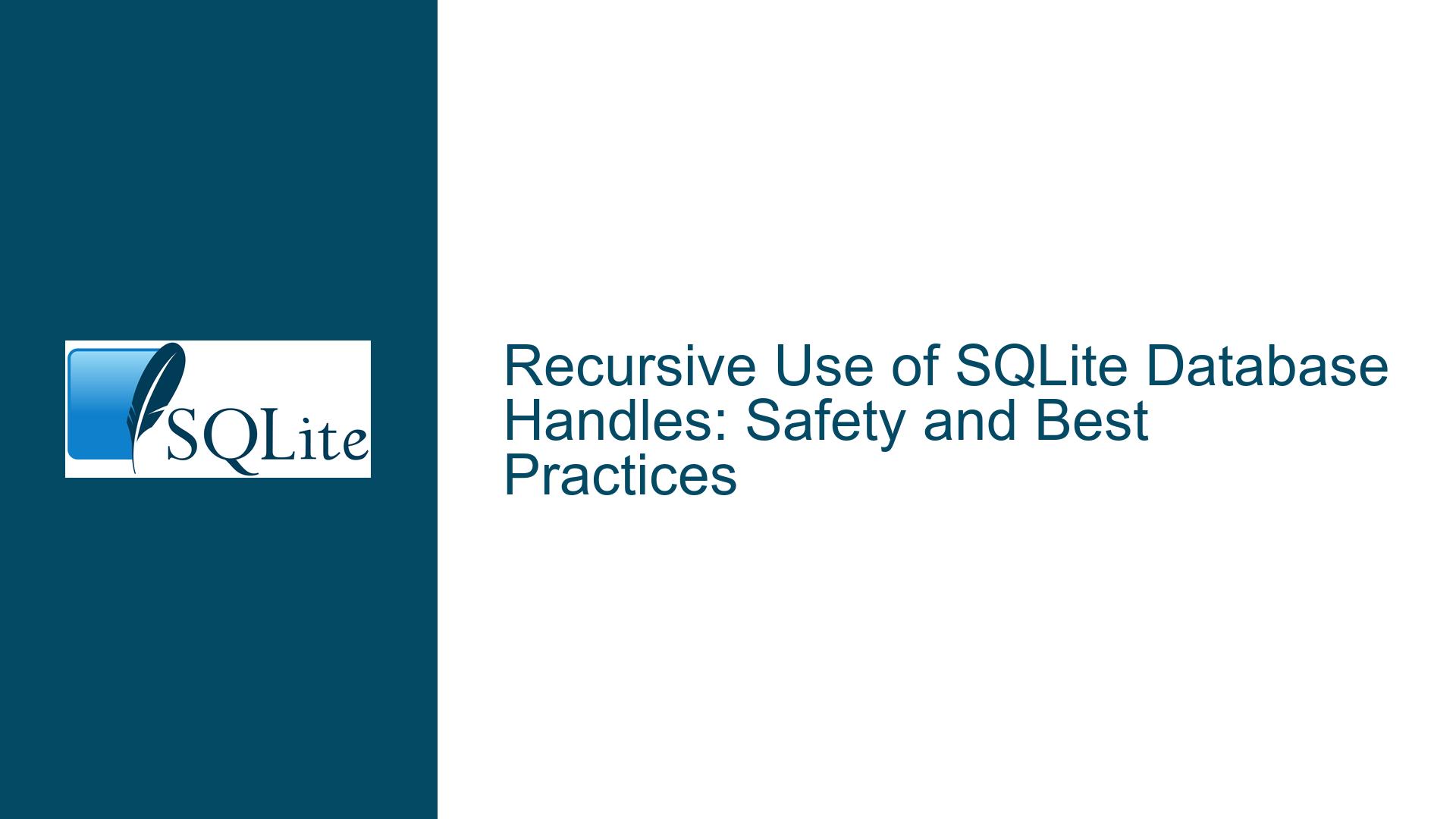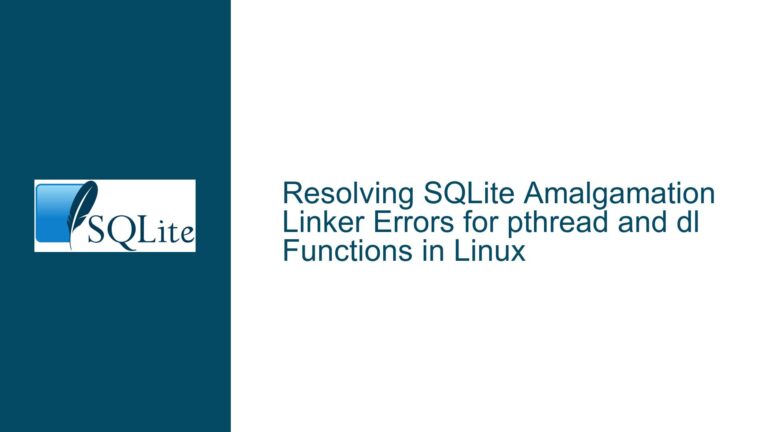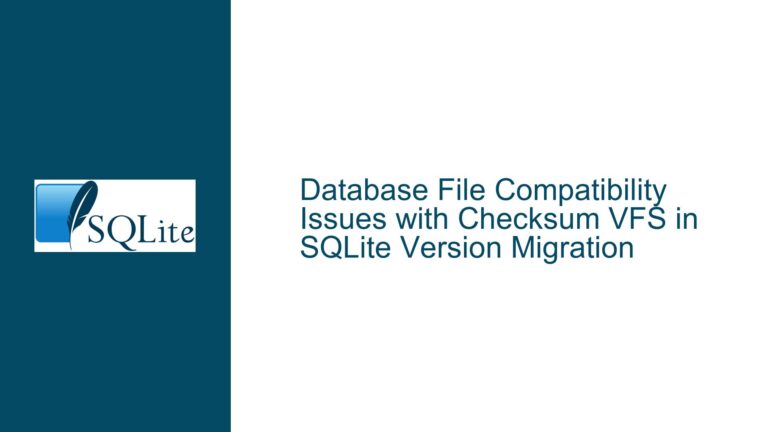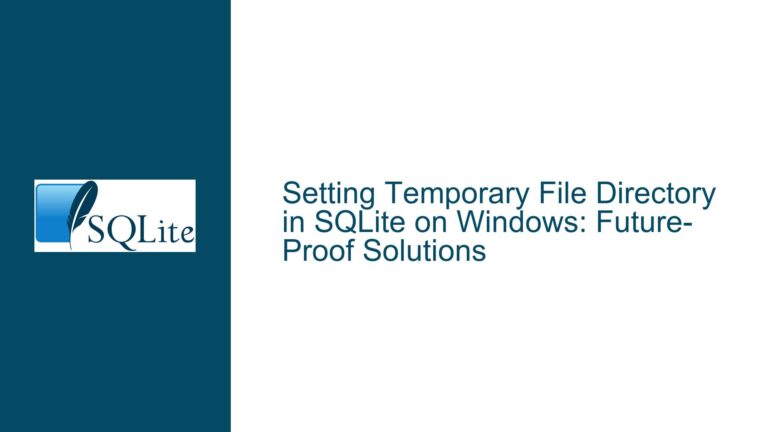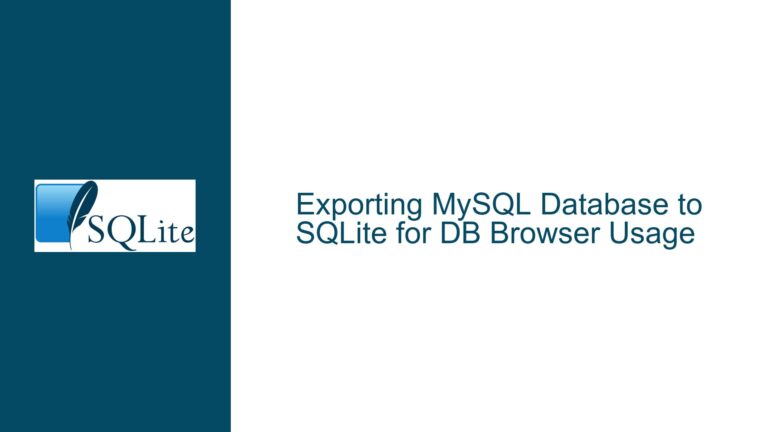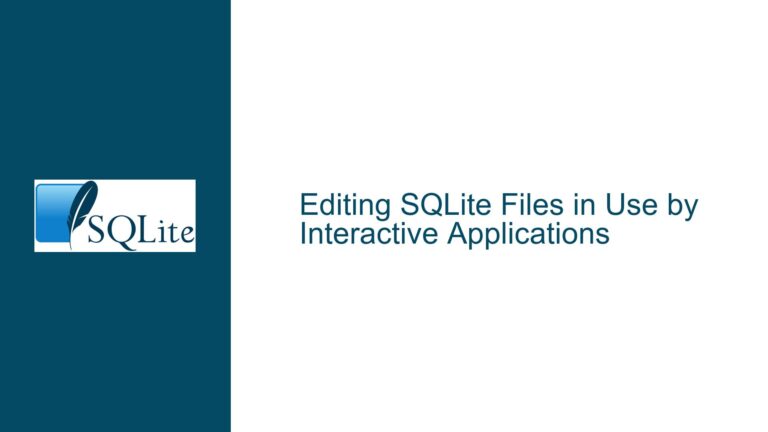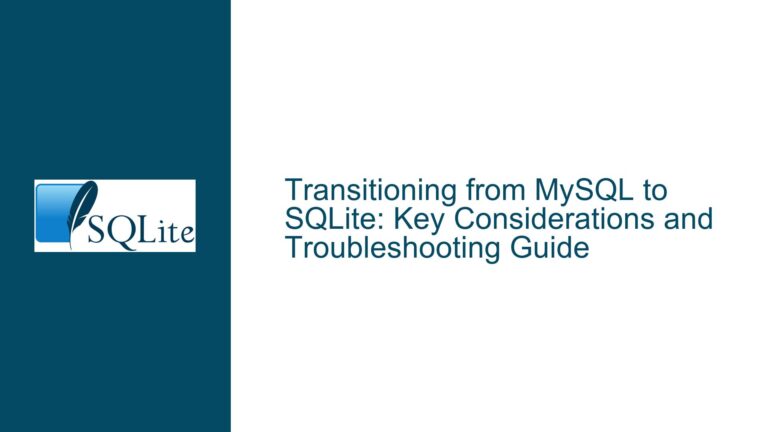Recursive Use of SQLite Database Handles: Safety and Best Practices
Understanding Recursive Database Handle Usage in SQLite Callbacks
Recursive use of a database handle (sqlite3*) refers to scenarios where the same connection object is reused within a callback function triggered by an ongoing SQLite operation. This pattern often arises in event-driven workflows, such as processing rows from a SELECT query and issuing additional queries within the callback to retrieve related data. At its core, SQLite is designed to support limited forms of reentrancy, but this capability is tightly coupled with the database’s internal state management.
A database handle encapsulates not just the connection to the database file but also transactional context, locks, prepared statements, and other runtime resources. When a callback function (e.g., a custom SQL function, a collation sequence handler, or a row processing callback for sqlite3_exec) is invoked, the database handle is in an active state. This means the handle is mid-execution, holding locks on the database file or pages in the buffer pool. Recursive queries initiated within this callback will attempt to manipulate the same handle, potentially altering its state while it is already in use.
The critical question is whether SQLite’s architecture permits such recursive operations without causing undefined behavior, crashes, or data corruption. The answer hinges on SQLite’s transaction state machine and its approach to concurrency. SQLite employs a coarse-grained locking model where a single write lock governs write operations, and shared locks manage reads. Recursive queries that trigger additional read operations (e.g., SELECT) may proceed safely if the handle’s state allows it. However, write operations (e.g., INSERT, UPDATE) or schema changes within a callback introduce complexities, as they require upgrading locks or modifying structures that might be in use by the outer query.
For example, consider a callback triggered by sqlite3_exec during a SELECT query. If this callback executes another SELECT using the same handle, SQLite will generally permit this, provided no conflicting locks are acquired. However, if the callback attempts a DELETE on the same table being read, the operation may fail with SQLITE_BUSY or deadlock if the outer query’s read transaction is still active. The safety of recursive operations is thus context-dependent, requiring developers to rigorously manage transaction boundaries, lock hierarchies, and error handling.
Risks and Common Missteps in Recursive Query Execution
Recursive handle usage becomes hazardous when developers overlook SQLite’s concurrency constraints or mismanage the handle’s lifecycle. Below are the most prevalent risks and their underlying causes:
1. Unsafe Transaction State Transitions
SQLite transactions operate in one of three states: autocommit, implicit transaction, or explicit transaction. When a recursive query is executed within a callback, it inherits the transaction state of the outer operation. If the outer query is part of an explicit transaction (BEGIN…COMMIT), a recursive write operation could inadvertently finalize the transaction (e.g., via COMMIT in the callback), leaving the outer query in an invalid state. This often manifests as SQLITE_MISUSE errors or silent data corruption if the outer logic assumes the transaction is still active.
2. Lock Hierarchy Violations
SQLite uses a lock escalation protocol: UNLOCKED → SHARED → RESERVED → PENDING → EXCLUSIVE. Recursive write operations within a callback may attempt to escalate locks while the outer query holds a lower-tier lock. For instance, if the outer query holds a SHARED lock for reading, a recursive INSERT in the callback will attempt to acquire a RESERVED lock. While this is permissible, attempting to commit the recursive write (escalating to EXCLUSIVE) while the outer query’s SHARED lock is still active will result in SQLITE_BUSY. This is because SQLite prohibits concurrent writers and readers within the same connection.
3. Resource Exhaustion and Leaks
Recursive queries that create unprepared statements (sqlite3_stmt* objects) or allocate memory (via sqlite3_malloc) without proper cleanup can exhaust SQLite’s internal resources. For example, a callback that recursively prepares a statement using sqlite3_prepare_v2 but neglects to call sqlite3_finalize will leak memory and statement handles. Over time, this leads to SQLITE_NOMEM errors or degraded performance.
4. Unsafe Handle Closure
As noted in the forum discussion, closing the database handle (sqlite3_close or sqlite3_close_v2) within a callback is a catastrophic error. If the outer query is still executing, closing the handle invalidates all associated resources, leading to segmentation faults or undefined behavior. This is especially insidious in multi-threaded environments where a separate thread might close the handle while a callback is active.
5. Reentrancy and Infinite Recursion
Recursive callbacks that trigger the same SQL operation can create infinite loops. For example, a trigger that updates a table column, which in turn fires another trigger, can cause unbounded recursion. SQLite has safeguards (e.g., MAX_TRIGGER_DEPTH, defaulting to 1000), but developers must still validate recursion depth in application logic.
Best Practices and Solutions for Safe Recursive Database Operations
To mitigate the risks outlined above, developers must adopt strict protocols for recursive handle usage. The following strategies ensure stability and correctness:
1. Isolate Recursive Queries in Separate Transactions
If a callback must perform write operations, execute them in a nested transaction using SAVEPOINT and RELEASE. This prevents the recursive operation from interfering with the outer transaction’s state:
int callback(void* data, int argc, char** argv, char** col_names) {
sqlite3* db = (sqlite3*) data;
// Start nested transaction
sqlite3_exec(db, "SAVEPOINT recurse;", 0, 0, 0);
// Perform recursive INSERT/UPDATE
sqlite3_exec(db, "INSERT INTO log VALUES (CURRENT_TIMESTAMP);", 0, 0, 0);
// Release savepoint
sqlite3_exec(db, "RELEASE recurse;", 0, 0, 0);
return SQLITE_OK;
}
This approach confines the recursive operation’s effects and allows rollback via ROLLBACK TO recurse; if errors occur.
2. Use Separate Prepared Statements
Avoid reusing sqlite3_stmt objects between the outer query and recursive callbacks. Each recursive query should prepare and finalize its own statements to prevent state collisions:
int callback(void* data, int argc, char** argv, char** col_names) {
sqlite3* db = (sqlite3*) data;
sqlite3_stmt* stmt;
const char* sql = "SELECT aux_data FROM metadata WHERE id = ?;";
if (sqlite3_prepare_v2(db, sql, -1, &stmt, 0) == SQLITE_OK) {
sqlite3_bind_int(stmt, 1, atoi(argv[0]));
while (sqlite3_step(stmt) == SQLITE_ROW) {
// Process aux_data
}
sqlite3_finalize(stmt);
}
return SQLITE_OK;
}
3. Enable Shared-Cache Mode for Advanced Scenarios
In multi-threaded applications, SQLite’s shared-cache mode allows multiple connections from the same thread to share a common cache. This can mitigate SQLITE_BUSY errors by decoupling recursive operations into separate handles:
sqlite3_enable_shared_cache(1); // Enable shared cache
sqlite3* db_main;
sqlite3_open_v2("main.db", &db_main, SQLITE_OPEN_READWRITE, NULL);
sqlite3* db_recurse;
sqlite3_open_v2("main.db", &db_recurse, SQLITE_OPEN_READWRITE, NULL);
// Use db_main for outer query, db_recurse in callback
Caution: Shared-cache mode introduces overhead and complexity; use it only when recursion is frequent and unavoidable.
4. Implement Timeout and Retry Logic
To handle SQLITE_BUSY errors gracefully, configure a busy handler using sqlite3_busy_timeout or a custom handler with sqlite3_busy_handler:
// Set a 300ms timeout for all operations on the handle
sqlite3_busy_timeout(db, 300);
// Or implement custom retry logic
int busy_handler(void* data, int attempts) {
if (attempts >= 5) return 0; // Abort after 5 retries
usleep(100000); // Wait 100ms
return 1;
}
sqlite3_busy_handler(db, busy_handler, NULL);
5. Avoid Schema Modifications in Recursive Code
ALTER TABLE, DROP INDEX, and other DDL operations invalidate prepared statements and can destabilize the database handle. If schema changes are unavoidable, execute them outside active transactions and ensure no statements are pending.
6. Leverage SQLite’s Built-in Recursion Safeguards
SQLite provides compile-time and runtime limits to prevent runaway recursion:
- SQLITE_MAX_TRIGGER_DEPTH: Limits trigger recursion (default 1000).
- SQLITE_LIMIT_COMPOUND_SELECT: Restricts the complexity of recursive CTEs.
Adjust these limits pragmatically:
PRAGMA recursive_truncate = ON; -- Terminate recursive CTEs after 1000 iterations
PRAGMA max_trigger_depth = 500;
7. Audit Handle Lifecycle Management
Ensure the database handle outlives all recursive operations. Use reference counting or ownership semantics to prevent premature closure:
typedef struct {
sqlite3* db;
int refcount;
} SafeHandle;
SafeHandle* handle_create(sqlite3* db) {
SafeHandle* h = malloc(sizeof(SafeHandle));
h->db = db;
h->refcount = 1;
return h;
}
void handle_acquire(SafeHandle* h) { h->refcount++; }
void handle_release(SafeHandle* h) {
if (--h->refcount == 0) {
sqlite3_close(h->db);
free(h);
}
}
// Usage in callback:
int callback(void* data, int argc, char** argv, char** col_names) {
SafeHandle* h = (SafeHandle*) data;
handle_acquire(h);
// Perform recursive operations on h->db
handle_release(h);
return SQLITE_OK;
}
By adhering to these practices, developers can harness SQLite’s recursive handle capabilities while maintaining stability. Always validate recursive logic under stress conditions (e.g., high concurrency, large datasets) to uncover edge cases before deployment.
